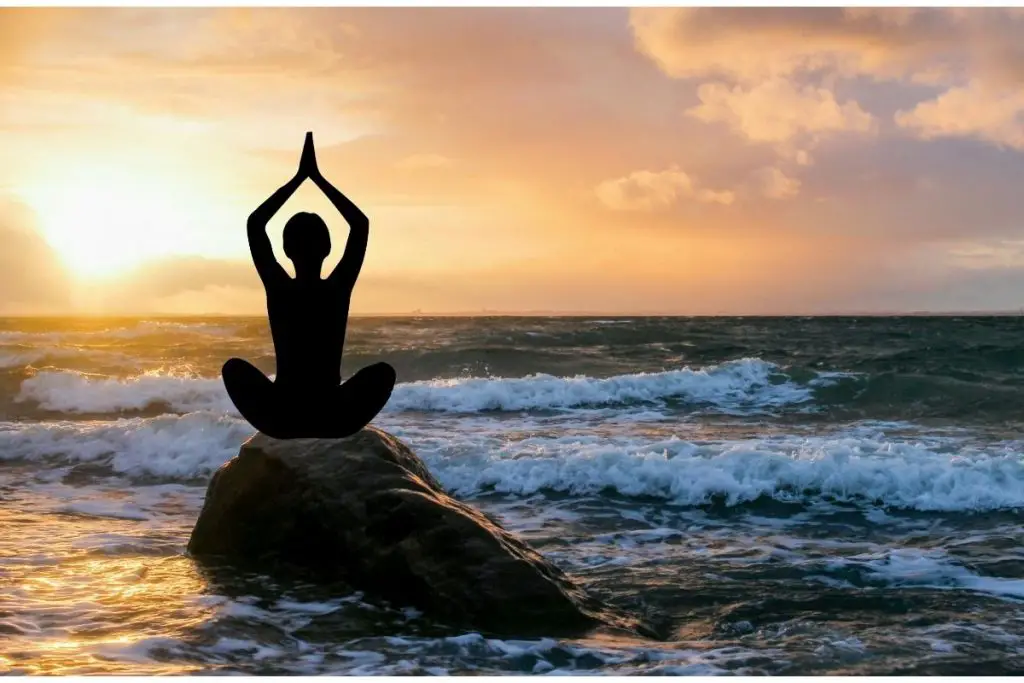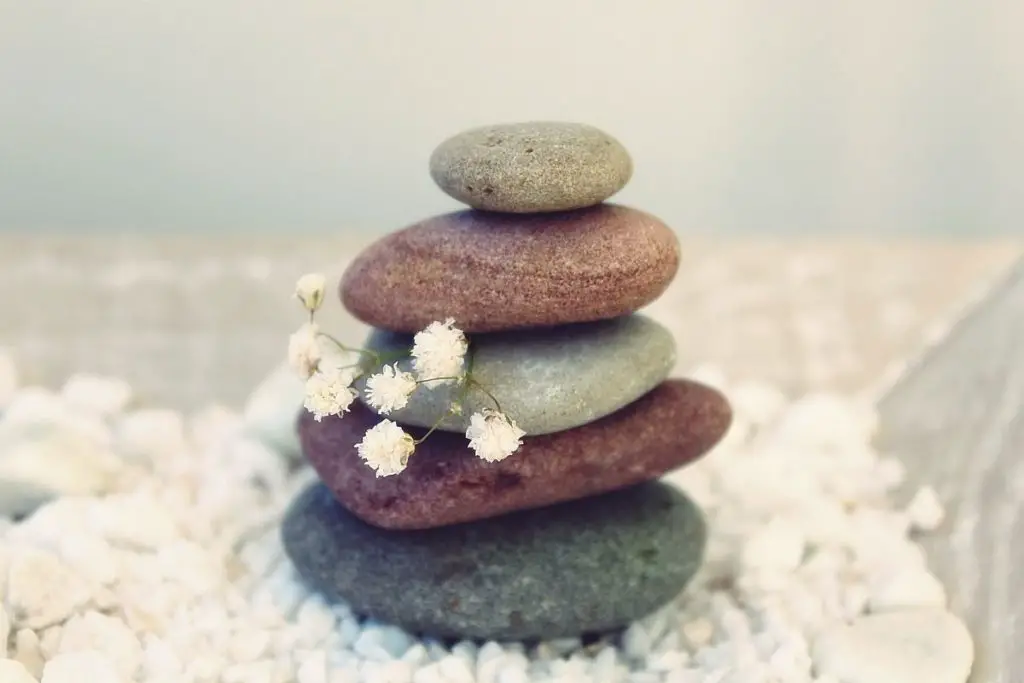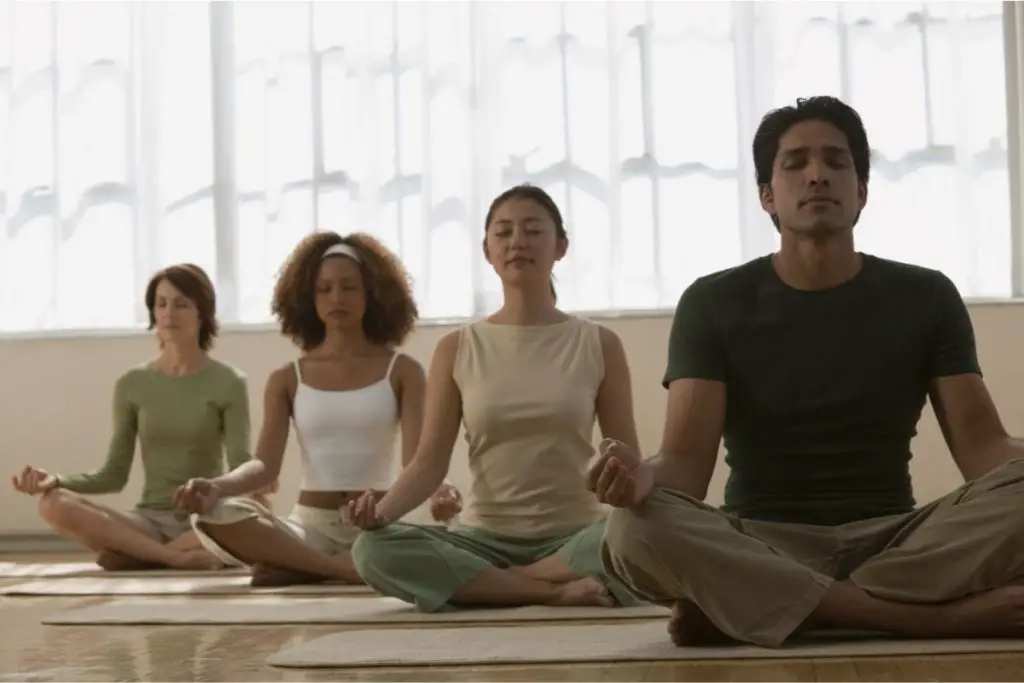In recent years, the practice of meditation has sprung into the mainstream, gaining fans and devotees from all around the world. From celebrities to politicians, major corporations to “wellness” coaches, it seems as though everyone is advocating the benefits of meditation, and hailing it as the catch-all solution to every problem,
While the popularity of meditation is no doubt a good thing – this is a technique that can really offer a number of significant benefits to individuals – there is a concern that the basic goal of meditation has been lost in the world of hashtags, merchandise, and retreats.
If you are looking to get back to basics and rediscover the heart and soul of your meditation practice, then you are in the right place – read on for everything you need to know about discovering the goal of meditation.

What Is Meditation?
Before we take a closer look at the goals and intentions behind meditation, it is useful to take a moment to consider just what meditation is – and, importantly, what it is not. Contrary to the image portrayed by the media, meditation is not an elderly man, sitting cross-legged in a dark cave.
Nor does it have to be a lithe young woman, clad in the latest sports gear, smiling blissfully as she sits on a stylish yoga mat. In truth, meditation is far more than both of these.
In the simplest terms, meditation is a practice that is designed to connect the mind and body as one. It aims to boost peace, calm, and clarity throughout the physical and mental bodies and encourages the practitioner to focus on the present, rather than worrying about the past or future.
Meditation can be carried out by anyone, regardless of their shape, size, weight, height, or experience – all you need is a quiet place where you can concentrate, a posture that you feel comfortable in, be that sitting or lying, and an open mind.
What Are The Benefits of Meditation?
Meditation offers a number of benefits to those who practice, and these include:
A Sense of Inner Peace
In order to better understand one of the advantages of meditation, it is a good idea to take a moment to consider your house. Imagine if you neglected your housework for several days – or even weeks.
While your home would still be liveable, it would soon start to become cluttered, dusty, and messy, with things out of place and askew, and, overall, it would not become a comfortable place to live, relax and enjoy.
In many ways, your body and mind work in exactly the same way. Over the course of our day, our minds become cluttered up with the events and “junk” of the day – this can be as a result of negative memories or emotions, fears or anxieties, or even taking on other people’s stresses and concerns.
Left unaddressed, this clutter can build up and become toxic, and we start to feel overwhelmed with stress, depression, and anxiety.
Meditation, on the other hand, allows us to “clean our houses”. It is a chance to work through the stresses and anxieties in a detached manner, clear them out, and experience a sense of calm relaxation and a blissful state of mind. With regular practice, this will become the state that you automatically return to time and again.
Live In The Now
As the old adage goes – depression is caused by living in the past, and anxiety is caused by worrying about the future. One solution to both of these is to practice living in the here and now – and this is where meditation can help. During your practice, you will be encouraged to focus on the present moment – nothing before, and nothing after.
This boosts your self-awareness, and ability to regulate your own thoughts. You will be able to acknowledge and address your thoughts, without giving them the power to harm you, allowing you to feel more in control.
According to experts, regular meditation has the power to physically rewire our brains, shrinking the regions associated with poor concentration, stress, and anxiety, and growing the areas associated with calmness, happiness, and improved cognition.
In other words, practicing meditation regularly actually helps your brain live in the present moment, and this offers a number of significant long-term benefits.

Become Inspired
Experts divide our active minds into two sections: the conscious mind and the subconscious mind. The former takes charge of our everyday thoughts and decisions, processing single thoughts at a time, and carrying out the decisions that we make.
The subconscious mind, on the other hand, works on another level and is responsible for inspiration, ideas, creativity, and coming up with innovative solutions to our problems.
Meditation helps us to pay closer attention to our subconscious mind, and this can gently nudge our inspiration and creativity into life, broadening our scope of ideas, and coming up with solutions and answers that our conscious mind could never have dreamed of.
This can also help to boost creativity, which offers its own benefits for our overall health and wellbeing.
Increase Happiness
Most humans make one big mistake when looking for happiness and fulfillment to give their lives meaning: they search for these things through external sources.
Material goods, large houses, external relationships, fame and fortune, and so on are all things that we reach for and grab hold of, in the mistaken belief that they will bring us joy and contentment.
One of the main issues with these things is that they are controlled by external circumstances, and so can change in the blink of an eye.
In truth, the only source of happiness that we can truly depend on is that which comes from within – and meditation plays a key role in this. Rather than rely on external stimuli for calmness, tranquility, and happiness, we can harness the power of our own minds, and find a sense of peace, balance, and true joy from within.
Increase Compassion
According to Buddhist beliefs, meditation can also make you more empathetic and compassionate, and they believe that this is a result of the realization, through meditation, that we are all connected. All human beings on the planet are connected, and, we, in turn, are connected to each and every thing in nature.
According to some experts, meditation helps practitioners to realize this connection through an appreciation of the bigger picture and that this, in turn, results in higher levels of empathy, understanding, and compassion – you realize that in the ways that matter, your enemy is just like you.
Improved Sleep
One of the most underrated benefits of meditation is that it can help you to enjoy more restful, rejuvenating sleep, largely through the act of decluttering your mind and reducing your stresses and anxieties. Once your mind is calm and ordered, you will find it much easier to drift off and are likely to enjoy a night of more restorative and quality sleep.

What is The Goal of Meditation?
Now that we have taken a closer look at just what meditation is, and the benefits that it can offer to your everyday life, it is time to return to the original question: what is the goal of meditation?
This can differ depending on who you ask. A wise sage may claim that the goal of meditation is to reach a higher level of spiritual consciousness and awakening; to connect to a higher plane of existence that transcends that of basic humanity, and enjoy a new, grand awakening.
Ask the same question of a Buddist monk, and he may tell you that meditation serves to allow us to connect to our fellow man and to heal the world through the alleviation of anxiety, fear, and suffering. Head to your local gym, and the instructor may assure you that meditation is a way to control our personal minds and to regain a calm, organized, and relaxed perspective.
The truth is that all of these are accurate, while at the same time, all missing one crucial element. The ultimate goal of meditation is to enjoy the process – and this is far more difficult than one may immediately realize.
When you first try to meditate, the chances are high that you will get in your own way a great deal of the time – you will be distracted by your own thoughts, by your itchy nose, by the sound of your neighbor’s lawnmower, and by that urgent work email that you must respond to. You will give up more than once; proclaiming that meditation is not for you, that you don’t have time, that you are not that kind of person.
The truth is that every time you return to your practice, something in you is changing. Every time you sit down to close your eyes, empty your mind, and focus on your breathing, you are ever so slightly shifting your mindset, priorities, and way of living.
Every time you make the conscious choice to try and meditate, you are putting mindfulness above everything else.
And every time you put your skills into practice in the “real world” – by taking a deep breath before you respond, by closing your eyes and grounding yourself before an important meeting, or simply by noticing that the daffodils have come out and that the sun is warm on your skin, you are achieving the goals of meditation and making small, subtle changes to every aspect of your life.
Final Thoughts
Meditation is a practice that is accessible and available to each and every individual. There is no need to invest in fancy equipment or book a studio; no requirement for a special outfit or expensive extras. All you need is a quiet place to sit, a position that is comfortable for you to maintain, the ability to keep an open mind, and, most importantly, perseverance.
This latter quality is perhaps the most important thing to remember when it comes to achieving the goal of meditation – remember that every single time you sit down to practice, no matter how “badly” you think you do it, you are making a little more space in your body, mind, and soul, unlocking your inner awareness, and continuing along the journey of rewiring your mind, reframing your thoughts, and transforming your life for the better.
